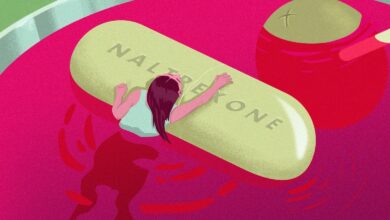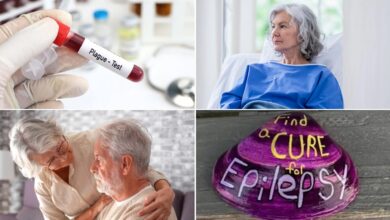I couldn’t get rid of my belly fat but doctors told me it was ‘normal’ and ‘hormonal’… until I was told the devastating truth

[ad_1]
When Karen Lurati looks in the mirror she sees the body that betrayed her – and is still coming to terms with the fact she may never be able to ‘trust it again’.
The mother of two, from Melbourne, was diagnosed at the age of 48 with liposarcoma, an extremely rare cancer that grows in fat cells.
Speaking to FEMAIL, the now 55-year-old explained the cancer was growing in her abdomen for 10 years, wrapping around her vital organs and making her look like she had put on weight.
And she had no idea.
At first Karen thought her 7.5kg weight gain, which began after the birth of her second child, was due to being a busy working mum.
When she started getting tired she blamed the same thing.
Then when doctors and naturopaths tried but failed to help her shed the weight, Karen took their advice that it was hormonal and part of the aging process.
Then the hot sweats started and in her mind – and the doctors – this meant hormones were definitely to blame.

Karen Lurati, pictured centre with her daughters, had cancer for 10 years before she was diagnosed with the disease
‘They told me it was a sign of menopause, even though at that point I looked pregnant, except it wasn’t completely smooth or hard it was soft and lumpy,’ she said.
But then one day, the marketing lecturer started feeling a familiar downward ‘push’.
‘It is the same push you feel when your baby is dropping and your body is getting ready for birth,’ Karen said.
But she wasn’t pregnant. Her daughters were 11 and 14 and she said it would have been ‘impossible’ at the time.
‘I thought it was a prolapse or something – because that was the only thing which made sense.’
Karen immediately went to the doctor who instructed her to get an internal ultrasound.
‘The ultrasound tech couldn’t see anything so did an external one as well,’ she said.
Within minutes she realised something was wrong. The tech’s facial expressions had changed and other people had come in and out of the room speaking in whispers.
‘They told me they had found something on a kidney but couldn’t be sure what it was,’ Karen said.
They said they usually don’t go that high up but there was obviously something.’

The mother-of-two from Melbourne was diagnosed with liposarcoma – a super rare cancer which grows in fat cells

The mum’s stomach had grown slowly over 10 years, she thought it was fat but it was actually a huge 7.5kg tumour
Karen went in for more tests and was given the devastating news that she had cancer.
‘At the end of the conversation with the doctor I remember saying “wait, do I have cancer?”,’ she said.
She had been in such shock the information hadn’t processed.
Karen underwent a series of radiotherapy which worked to ‘create a sack’ around the liquid-like tumour.
Then she had surgery for 11 hours to remove a kidney, some of her bowel and the huge growth.
‘People keep asking me how I didn’t know – it was the size of two babies,’ she said.
‘But my doctors didn’t know either and I had gone to them about it.’

Karen and her doctors assumed her changing body shape was hormonal and a result of having two children
Karen is telling her story to raise awareness for sarcoma and other rare cancers in the hopes doctors will educate themselves on the signs and symptoms so they can help patients.
According to the Australia and New Zealand Sarcoma Association (ANZSA) rare cancers make up 30 percent of all cancers diagnosed in Australia.
Long-term survival rates are poor and account for 42 per cent of all cancer deaths in Australia.
Karen’s cancer diagnosis happened in 2017 – she still struggles with the idea that her body hid the disease for so long.
And every time she has a scan to check for more growths she fears it has happened again.
‘It isn’t until the results come through that you can really feel confident,’ Karen said.
[ad_2]
Source link




